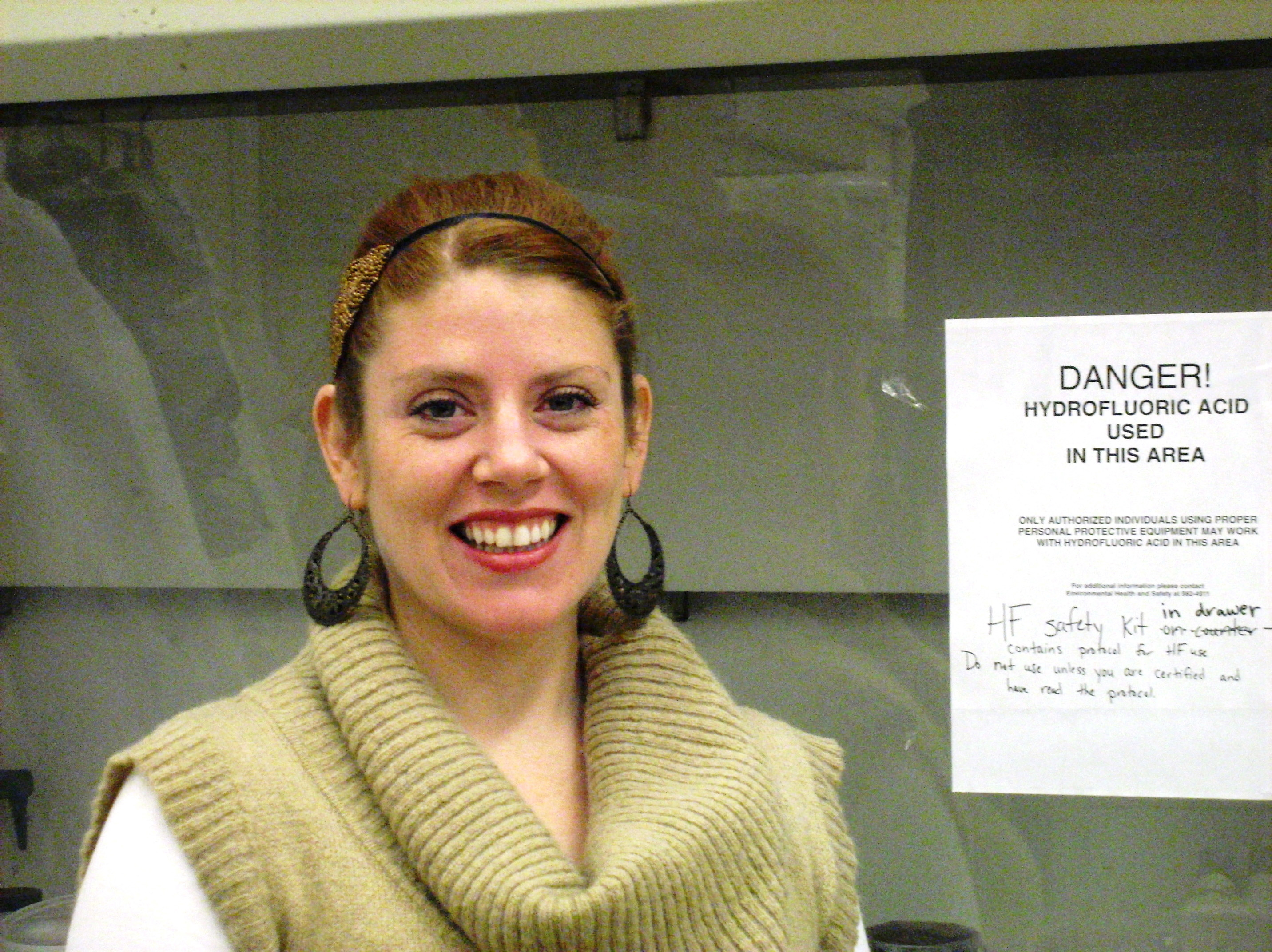December 15, 2011 — As an undergraduate chemistry student at the University of Mississippi (class of 2005), Trisha Vickrey taught a summer science camp for elementary students and discovered a passion for science outreach.
"I was really able to see my role as a scientist in community education," said Vickrey, who later served a one-year stint as a science and math teacher at a charter school in Maumelle, Ark. She now is a fifth-year chemistry doctoral student in the University of Virginia's Graduate School of Arts & Sciences.
Vickrey will continue her science outreach interests this spring as a new Christine Mirzayan Science and Technology Policy Graduate Fellow. She'll be working at the National Academy of Science's Marian Koshland Science Museum in Washington, D.C., where she will help develop a new "Life Labs" exhibit on aging, the human brain and learning.
"My passion for science outreach got me interested in science policy," Vickrey said. "I want to know how, as a scientist, I can shape or influence scientific literacy and how I can work with policy-makers to improve public understanding of complex, scientific issues. I am also interested in what capacity that I, as a scientist, can improve K-12 science, technology, engineering and mathematics education in the United States."
At U.Va., working in the lab of chemistry professor Jill Venton, Vickrey studies the fruit fly as a model system for understanding the regulation of dopamine, a neurotransmitter that sends signals between nerve cells in the brain.
She also has founded a science outreach group called the Chemistry LEAD Program that helps local elementary school students perform hands-on, inquiry-based science experiments.
To date, Vickrey's group has visited more than 45 Virginia classrooms and taught more than 1,000 students, and they recently partnered with the Virginia Discovery Museum to teach a monthly class. Vickrey also has done science outreach with at-risk middle school girls and high school students, and is trying to form a STEM networking initiative.
"Trisha is a great example of a quality student who also does lots of community outreach," said Venton, Vickrey's adviser. "And as a researcher, Trisha has proven that the fruit fly has similar regulation of dopamine neurotransmission as mammals."
For her efforts, Vickrey this year received an American Chemical Society Division of Analytical Chemistry graduate fellowship, one of only seven given nationally, and a U.Va. Graduate School of Arts & Sciences fellowship.
After graduating from U.Va. next summer , Vickrey said she hopes to attend Princeton University for a master's degree in public policy and ultimately work on K-12 STEM education and scientific literacy projects for a national organization, such as the National Science Foundation, the Board of Science Education or the National Academies of Sciences.
"While Trisha is an outstanding bench scientist, her abilities to relate science to children and non-scientists are extraordinary," Venton said. "She will be able to serve the field of science well by translating high-tech research into everyday language."
"I was really able to see my role as a scientist in community education," said Vickrey, who later served a one-year stint as a science and math teacher at a charter school in Maumelle, Ark. She now is a fifth-year chemistry doctoral student in the University of Virginia's Graduate School of Arts & Sciences.
Vickrey will continue her science outreach interests this spring as a new Christine Mirzayan Science and Technology Policy Graduate Fellow. She'll be working at the National Academy of Science's Marian Koshland Science Museum in Washington, D.C., where she will help develop a new "Life Labs" exhibit on aging, the human brain and learning.
"My passion for science outreach got me interested in science policy," Vickrey said. "I want to know how, as a scientist, I can shape or influence scientific literacy and how I can work with policy-makers to improve public understanding of complex, scientific issues. I am also interested in what capacity that I, as a scientist, can improve K-12 science, technology, engineering and mathematics education in the United States."
At U.Va., working in the lab of chemistry professor Jill Venton, Vickrey studies the fruit fly as a model system for understanding the regulation of dopamine, a neurotransmitter that sends signals between nerve cells in the brain.
She also has founded a science outreach group called the Chemistry LEAD Program that helps local elementary school students perform hands-on, inquiry-based science experiments.
To date, Vickrey's group has visited more than 45 Virginia classrooms and taught more than 1,000 students, and they recently partnered with the Virginia Discovery Museum to teach a monthly class. Vickrey also has done science outreach with at-risk middle school girls and high school students, and is trying to form a STEM networking initiative.
"Trisha is a great example of a quality student who also does lots of community outreach," said Venton, Vickrey's adviser. "And as a researcher, Trisha has proven that the fruit fly has similar regulation of dopamine neurotransmission as mammals."
For her efforts, Vickrey this year received an American Chemical Society Division of Analytical Chemistry graduate fellowship, one of only seven given nationally, and a U.Va. Graduate School of Arts & Sciences fellowship.
After graduating from U.Va. next summer , Vickrey said she hopes to attend Princeton University for a master's degree in public policy and ultimately work on K-12 STEM education and scientific literacy projects for a national organization, such as the National Science Foundation, the Board of Science Education or the National Academies of Sciences.
"While Trisha is an outstanding bench scientist, her abilities to relate science to children and non-scientists are extraordinary," Venton said. "She will be able to serve the field of science well by translating high-tech research into everyday language."
— By Fariss Samarrai
Media Contact
Article Information
December 15, 2011
/content/nas-fellowship-allows-chemistry-grad-student-trisha-vickrey-pursue-k-12-outreach

